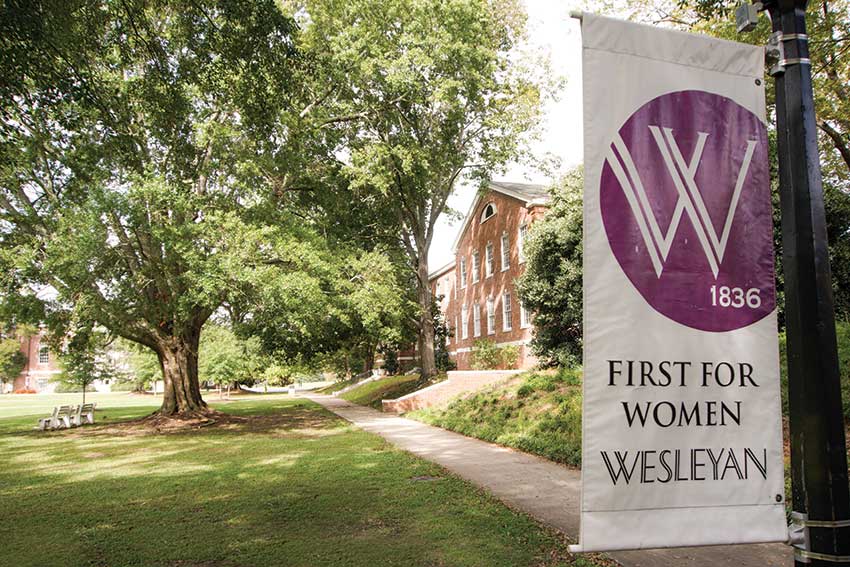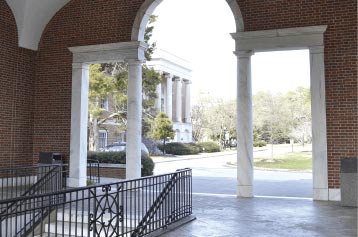2023-2024 Catalogue
Religion, Philosophy, and Social Change
In the Religion, Philosophy, and Social Change major students have the opportunity to engage areas of study essential to the liberal arts. The major thereby prepares students to understand, analyze, and work with diverse systems of thought and practice that shape individual and public life. All majors will develop a broad methodological base from theology, ethics, history, philosophy, critical theory, sociology, literature, leadership, and material culture to explore the intersections and intimate connections between systems of belief and practices, ethical codes, narratives, and social and political structures across many cultures and centuries.
Students in the RPS major will also choose which of three subjects they are most interested in pursuing by declaring one of the following concentrations: religious studies, philosophy and critical theory, or leadership and social change.
- Religious Studies is the critical inquiry into cultural expressions — such as myth, ritual, symbol, and sacred texts — that address fundamental human concerns. Students on the religious studies concentration will gain a foundational understanding of Christianity, but will also study other religious traditions. Religious Studies uses a variety of methodological approaches (including philosophy, sociology, theology, and anthropology) to understand critically what religious people believe and do, what religion teaches us about the human condition, and how religion shapes public life.
- To engage in philosophical reflection and critical theory is to reflect on the fundamental nature and meaning of our very existence, the role power plays in such meaning making, and the role of critical thinking in constructing, deconstructing, and reconstructing such meaning. The study of philosophy and critical theory is thus at once both deeply personal (as the question of the meaning of my own existence) and communal (as the question of our shared historical human identity and responsibility).
- Social Change names the changes in human-driven interactions and relationships that transform cultural and social institutions. Students on the leadership and social change concentration will be exposed to interdisciplinary approaches to questions of power and identity, the principles of effective leadership, and the social change model of leadership. This path of study will prepare students for careers that require experience with advocacy, social change models, organizational change strategy, and service and nonprofit leadership.
The fields of religion, philosophy, and social change are essentially about critically engaging beyond the classroom and providing models to address questions of the ultimate, belief, and ethical life. The study of the historical, political, and sociocultural contexts of religious and philosophical traditions grounded in an ethos of social change provides an intellectual background for those interested in pursuing careers in social service, education, ministry, government, journalism and the arts.
Students majoring in Religion, Philosophy, and Social Change and concentrating in Religious Studies are not eligible to also receive a Religious Studies minor.
Students majoring in Religion, Philosophy, and Social Change and concentrating in Philosophy and Critical Theory are not eligible to also receive a Philosophy minor.
The student learning outcomes for the Religion, Philosophy, and Social Change major are as follows:
- The student will develop more fully their knowledge of the diversity of the world's religions, philosophies, and cultural expressions — such as myth, ritual, symbols, and sacred texts — that address fundamental human concerns;
- They will develop a broad methodological base from areas such as philosophy, sociology, psychology, religious studies, and literature to address comprehensively and cross-culturally such issues as the origins and practices of religious communities; the nature of existence; the nature of justice; and how best to effect social change;
- Through a grounding in constructive theological and philosophical thinking, they will strengthen their abilities to think critically, analyze cogently, organize and articulate thoughts clearly, and develop their own informed opinions;
- They will learn to assess the influence the past has on contemporary issues in the study of religion, philosophy, and social change.
- By engaging in one of three concentrations, the student of Religion, Philosophy, and Social Change will gain an in-depth knowledge of the theories and methods of religious studies, philosophy and critical theory, or leadership and social change. Such knowledge will result in:
- For the student in the religious studies concentration: a cross-cultural understanding of the origins of religious communities, their similar and divergent practices and beliefs, and their literature; and a grounding in the historical analysis of religious practices, communities, traditions, beliefs, and scriptures, as they learn to assess the influence the past has on contemporary issues in the study of religion.
- For the student in the philosophy and critical theory concentration: a cross-cultural and historical understanding of the methods and processes of philosophical reflection; a greater agility in their own reasoning process; the ability to critically engage questions of power and identity; and the ability to articulate more imaginative and thoughtful responses to life’s challenges.
- For the student on the leadership and social change concentration: an interdisciplinary understanding of theories of power, social change, and leadership; the ability to apply the social change model of leadership to real world problem solving; and the ability to articulate their own theory of leadership and social change.
COURSE REQUIREMENTS FOR THE MAJOR
39 credits and a senior project to completed in the senior seminar.
Students majoring in Religion, Philosophy, and Social Change are required to complete a core set of common courses, along with courses that satisfy the specific requirements of their chosen concentration. Full descriptions for REL courses can be found in Religious Studies, while PHI course descriptions are available in Philosophy.
- Core Courses Required for all majors (15 Hours)
- REL 100: Theories and Methods in the Study of Religion
- PHI 101: Introduction to Philosophy
- PHI 223: Ethics
- REL 225: Exploring the World’s Religions
- REL/PHI/LED 450: Senior Project Seminar
Religious Studies Concentration (24 hours)
- Required (6 hours)
- REL 110: Introduction to Theology
- REL 120: Introduction to Christianity
- Three of any of the following (9 hours)
- REL 203: Hebrew Bible/Old Testament
- PHI/LED 207: Effective Leadership in Community
- REL 212: Abrahamic Traditions
- REL/WST 213: Gender and Religion
- REL/PHI 216: Faith and Doubt
- REL 280: Sacred Texts and Social Change
- REL 290: Readings in Religious Studies
- Three of any of the following (9 hours)
- REL/PHI 306: Seminar in Ancient and Medieval Thought
- PHI/LED 307: Power and Service Leadership
- REL/PHI 309: From Modernism to Postmodernism
- REL 310: Religion and Society
- REL 396: Special Topics in Religious Studies
- REL 451: Directed Independent Study
Philosophy and Critical Theory Concentration (24 hours)
- Required (6 hours)
- PHI 210: Readings in Philosophy
- REL/PHI 309: From Modernism to Postmodernism
- Three of any of the following (9 hours):
- PHI/LED 207: Effective Leadership in Community
- ENG 210: Introduction to Literary Criticism
- COM 215: Introduction to Media Studies
- REL/PHI 216: Faith and Doubt
- PHI 224: Logic
- PHI/POL 240: Introduction to Political Thought
- Three of any of the following (9 hours):
- PHI/POL 300: Foundations of Political Thought
- REL/PHI 306: Seminar in Ancient and Medieval Thought
- PHI/LED 307: Power and Service Leadership
- COM/WGS 338: Identity, Power, & Culture
- ENG 353: Seminar in Race, Class, and Gender
- PHI/WST 355: Gender and Philosophy
- PHI 451: Directed Independent Research
Leadership and Social Change Concentration (24 hours)
- Required (6 hours)
- PHI/LED 207: Effective Leadership in Community
- PHI/LED 307: Power and Service Leadership
- Three of any of the following (9 hours)
- PHI 210: Readings in Philosophy
- BUS/ECO/WST 210: Women and Economic Development
- REL 213: Gender and Religion
- HIS 215: Reacting to the Past
- REL/PHI 216: Faith and Doubt
- COM 216: Intercultural Communication
- PHI 224: Logic
- POL/WST 225: Gender and Politics
- PSY 235: Nature and Manifestation of Prejudice
- PHI/POL 240: Introduction to Political Thought
- WGS 250: Global Feminisims
- REL 280: Sacred Texts and Social Change
- Three of any of the following (9 hours)
- PHI/POL 300: Foundations of Political Thought
- POL 306: Environmental Politics and Policy
- REL/PHI 309: From Modernism to Postmodernism
- REL 310: Religion and Society
- ENG 353: Seminar in Race, Class, and Gender
- PHI/WST 355: Gender and Philosophy
- POL 356: Activism and Political Organization
- REL 451: Directed Independent Study
- PHI 451: Directed Independent Study



